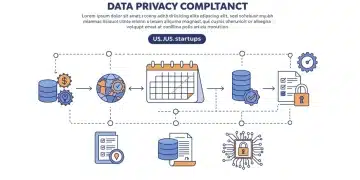Insights on U.S. cloud regulation policies you need to know
Insights on U.S. cloud regulation policies highlight critical aspects such as data privacy, compliance frameworks, and the impact of regulations on both businesses and consumers, ensuring a secure cloud environment for all stakeholders.
Insights on U.S. cloud regulation policies can influence how your business handles data and privacy. Are you aware of the latest changes? In this article, we’ll dive into the crucial regulations that affect cloud computing and what they mean for you.
Understanding the current U.S. cloud regulation landscape
Understanding the current U.S. cloud regulation landscape is essential for businesses that rely on cloud services. With rapid technological advancements, regulations around cloud computing are evolving to ensure data security and privacy. Companies must stay updated on these changes to maintain compliance and build trust with their customers.
Key Elements of U.S. Cloud Regulations
Several core aspects define the current U.S. cloud regulation environment:
- Data Protection: Regulations focus on safeguarding sensitive data hosted in the cloud.
- Compliance Standards: Businesses are required to follow industry-specific compliance protocols.
- Consumer Rights: Cloud users have rights regarding access to and control over their data.
These elements reflect the increasing importance of cloud computing regulations. As the landscape continues to change, organizations need to navigate these rules effectively. The implications of non-compliance can be severe, including legal penalties and loss of customer trust.
Understanding Compliance Challenges
Many organizations face challenges when adapting to new regulations. They may struggle to understand specific requirements or implement adequate security measures. Continuous training and education on cloud compliance can help mitigate these challenges. Regular audits can also ensure that businesses are adhering to regulations, providing peace of mind and reducing potential risks.
Moreover, seeking legal advice can offer clarity and guidance, aiding organizations in successfully avoiding pitfalls associated with cloud regulation. A proactive approach not only enhances compliance but also enhances the overall security framework of the business.
As cloud technology continues to advance, staying informed about U.S. regulations becomes increasingly crucial. Both businesses and consumers benefit from a well-regulated cloud environment.
Key policies shaping cloud computing in the U.S.

Key policies shaping cloud computing in the U.S. are vital for understanding how businesses manage data and technology. These policies aim to protect users while ensuring that innovative cloud solutions are available. As technology evolves, so do the regulations designed to govern cloud services.
Major Policies Impacting Cloud Computing
Several important policies influence how cloud services operate:
- Federal Data Protection Laws: These laws establish standards for protecting personal and sensitive information.
- State-Specific Regulations: Different states have unique rules impacting data storage and transfer.
- Industry Standards: Guidelines from industries like finance and health enforce strict compliance requirements.
These policies create a framework that helps businesses navigate the complexities of cloud computing. Organizations must adapt to these regulations to mitigate risks and protect consumer data.
The Role of the Federal Trade Commission (FTC)
The FTC plays a significant role in enforcing consumer protection laws related to cloud services. They monitor unfair practices and require transparency in how companies handle user data. This ensures that cloud providers maintain high standards of integrity and accountability.
Staying compliant with FTC regulations is crucial for cloud service providers. Failure to do so could result in legal action and damage to a company’s reputation. Therefore, businesses must establish rigorous compliance programs and conduct regular audits.
As policies continue to shape the cloud landscape, understanding these key regulations ensures that organizations can leverage cloud computing effectively while safeguarding sensitive information.
Impact of regulations on businesses and consumers
The impact of regulations on businesses and consumers is significant in the realm of cloud computing. Regulations help create a safer online environment by establishing standards that protect sensitive information. They are essential for maintaining trust between providers and users.
Benefits for Businesses
Businesses gain several advantages from stringent cloud regulations:
- Enhanced Security: Regulations require companies to implement stronger security measures, reducing the risk of data breaches.
- Consumer Trust: Compliance with regulations builds trust among customers, knowing their data is protected.
- Market Advantage: Companies that adhere to regulations are often perceived as more responsible, attracting more clients.
By following regulations, businesses can avoid hefty fines and litigation costs. This proactive approach helps them focus on growth and innovation rather than compliance issues.
Effects on Consumers
For consumers, regulations play a crucial role in protecting their rights. When cloud providers comply with regulations, users can expect:
- Data Privacy: Regulations safeguard personal information from misuse and unauthorized access.
- Clear Rights: Consumers have clear rights regarding their data, including how it is used and shared.
- Accountability: Regulations hold companies accountable for their practices, ensuring they prioritize customer interests.
Furthermore, consumers benefit from transparency and better service quality. Knowing that providers are regulated instills confidence, encouraging more people to embrace cloud technology.
A strong regulatory framework creates a favorable environment for both businesses and consumers, ensuring that the growth of cloud computing remains sustainable and secure.
Future trends in cloud regulation and compliance

Future trends in cloud regulation and compliance are shaping the next phase of technology. With the rapid evolution of cloud services, regulations are adapting to meet new challenges. Businesses must stay informed about these trends to ensure compliance and security.
Increased Focus on Data Privacy
As data breaches become more common, regulations are expected to emphasize data privacy. This means stricter rules for how companies collect, store, and share data. Organizations will need to implement robust data protection measures to comply. For example, privacy policies will likely require clear communication with consumers about their data usage.
Enhanced Global Cooperation
Future cloud regulations will feature enhanced cooperation between countries. Since cloud computing often transcends borders, international standards are becoming vital. Companies will need to navigate the regulations of multiple jurisdictions. Aligning with global compliance practices can simplify operations and reduce legal risks.
- Cross-Border Data Transfers: Regulations may standardize how data is transferred between countries.
- Joint Cybersecurity Initiatives: Countries will collaborate on cybersecurity policies to better protect users.
- Unified Compliance Frameworks: A global framework could help businesses maintain compliance across different regions.
Technology will also play a significant role in future regulations. The rise of artificial intelligence and machine learning will be addressed by new compliance standards. Companies using these technologies must ensure they follow ethical guidelines and handle data responsibly.
Public awareness about data protection is rising. Consumers are more informed and demand transparency from service providers. Regulations will likely evolve to empower customers, granting them more control over their personal information. As these trends develop, staying ahead in compliance will be crucial for businesses aiming to thrive in the cloud environment.
FAQ – Frequently Asked Questions about Cloud Regulation and Compliance
What are the main benefits of cloud regulations for businesses?
Cloud regulations enhance security, build consumer trust, and provide a market advantage by ensuring responsible data handling.
How do regulations impact consumer rights in cloud computing?
Regulations protect consumer privacy, ensure clear rights regarding data use, and hold companies accountable for their practices.
What future trends should businesses expect in cloud compliance?
Businesses should prepare for increased focus on data privacy, enhanced global cooperation, and stronger cybersecurity standards.
Why is transparency important in cloud services?
Transparency helps consumers understand how their data is used, fostering trust and ensuring compliance with regulations.





